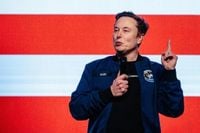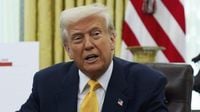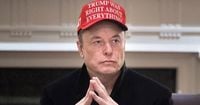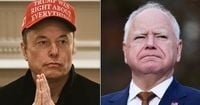Elon Musk, the CEO of Tesla Inc., has recently acknowledged the significant toll his political involvement is taking on his primary business, Tesla. Speaking at a town hall event in Wisconsin, Musk noted that his role in President Donald Trump’s initiative to cut government size is costing him both time and resources, stating, "It’s costing me a lot to be in this job." He pointed out that his political opponents have leveraged the decline in Tesla’s stock to apply pressure on him and the company.
Since reaching a peak on December 17, Tesla shares have plummeted by 45%, leading to a substantial decline in Musk’s personal wealth, which has dropped by over $100 billion this year, according to the Bloomberg Billionaires Index. Despite this, Musk remains optimistic about Tesla’s long-term prospects, suggesting that the current situation could represent a buying opportunity for investors.
As Musk prepares for the Wisconsin state supreme court election on April 1, he has invested more than $14 million in support of Republican candidate Brad Schimel, who is facing off against Democrat Susan Crawford. This election is seen as pivotal for the ideological balance of the state’s highest court, currently held by a liberal majority. Musk has actively participated in the campaign, even distributing $1 million checks to local voters.
Wisconsin Senator Ron Johnson remarked that if Schimel wins, Musk will deserve credit for it, emphasizing the election's potential impact on significant issues like abortion and redistricting. Musk has also raised concerns about future adverse rulings on redistricting in Wisconsin, which could jeopardize Republican control in the U.S. House of Representatives.
In addition to his political donations, Musk has faced considerable backlash for his involvement in politics, particularly from a global protest movement dubbed the Tesla Takedown Global Day of Action. This initiative saw coordinated demonstrations against Musk’s political activities, with over 200 events organized worldwide, including locations in Australia, New Zealand, and several European countries. The movement aims to challenge Musk’s influence and seeks to undermine Tesla’s market position by rallying public sentiment against him.
Responding to the protests, Musk made a dismissive remark on X, the social media platform he owns, suggesting that the demonstrators were merely afraid of having to seek real employment. This response reflects Musk’s perception of the protests as a left-wing conspiracy to silence him and his initiatives.
The protests were also supported by the UK’s Stop Trump Coalition, which is organizing against President Trump’s upcoming state visit. Organizers of the protests claim they are effective in raising awareness and damaging Tesla’s brand, thereby impacting sales.
Compounding the challenges facing Tesla, analysts are bracing for a decline in global demand. On April 2, Tesla is expected to release first-quarter delivery data, which is projected to show a decrease compared to the same period last year. Dan Ives, a managing director at Wedbush Securities, forecasts deliveries will fall between 355,000 and 360,000 units, a 7% decline from last year and significantly lower than initial predictions of 400,000.
According to Ives, about 30% of this anticipated decline is attributed to brand damage linked to Musk’s political activities. Matthias Schmidt, a Berlin-based electric car analyst, echoed these sentiments, stating that Musk has become a "toxic issue" for the brand, urging him to step back before the situation worsens.
Recent market research indicates a shift in Tesla’s customer demographics, with the percentage of Democrat owners dropping from 40% during the Biden administration to just 29% now. Conversely, the Republican ownership group has remained steady at around 30%. This shift reflects broader consumer sentiment and dissatisfaction with Musk’s political actions.
Adding to the pressure, President Trump recently announced a 25% tariff on imported vehicles, which is expected to impact Tesla despite its manufacturing base in the U.S. Musk acknowledged on X that Tesla is "not unscathed" by the tariffs, emphasizing their significant impact on the company's operations.
As the situation unfolds, analysts warn that the tariffs could plunge the global auto industry into chaos, prompting all manufacturers to raise prices. Trump has expressed indifference to potential price hikes, suggesting that they might encourage consumers to buy American-made cars instead.
The combination of political involvement, public backlash, and market dynamics presents a precarious landscape for Musk and Tesla. As the company prepares to release its first-quarter delivery figures, investors and analysts alike are watching closely to gauge the impact of these factors on Tesla’s future.








